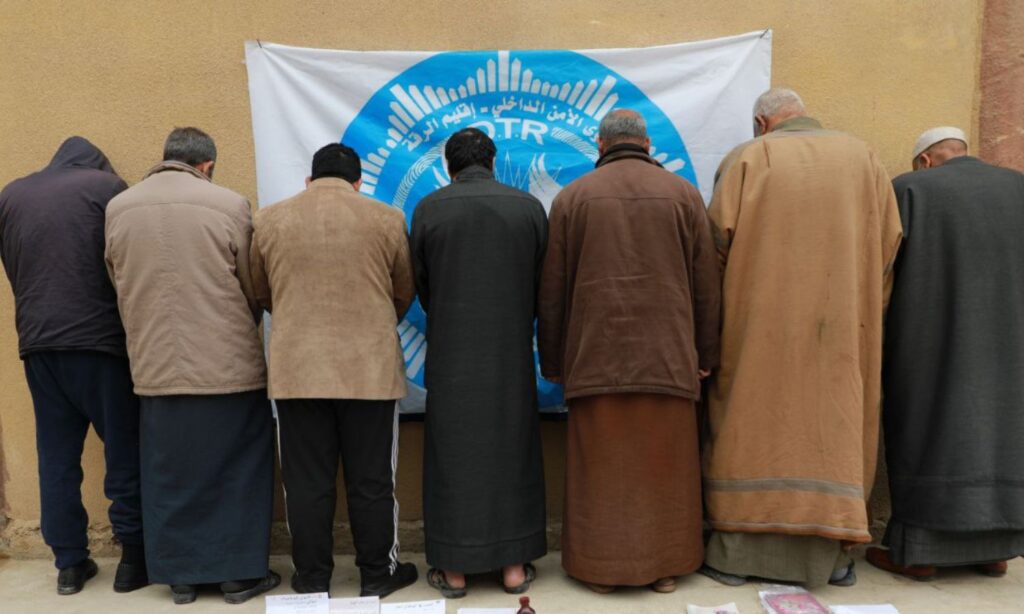Al-Hasakah – Ruba Abbas
During a period lasting a month and a half, “Basil,” who lives in southern al-Hasakah, experienced terrifying incidents, some of which led to the miscarriage of his pregnant wife due to fear. When he tried to recite the Quran, his tongue would be tied, and he couldn’t speak, following the witchcraft he had been subjected to.
“Basil,” a pseudonym, believes he was subjected to “ta’oom” witchcraft (meaning he ingested it) after two women who wanted revenge on him presented it to him through Eid al-Fitr sweets in 2023, which he consumed in good faith, only to experience hallucinations and terrifying incidents that disturbed the family atmosphere, as he told Enab Baladi.
Basil (29 years old) mentioned to Enab Baladi that his family took him to a healer until he was able to rid himself of the witchcraft that almost destroyed his life, as he expressed.
After what he described as a “terrifying and bitter” experience, Basil believes that the spread of witchcraft and sorcery is related to ignorance and the absence of deterrents or accountability, calling for stricter laws to punish those dealing with sorcery and witchcraft.
Witchcraft is spreading in the Syrian Jazira region and affects the lives of many individuals, despite the existence of laws that combat the phenomenon by the Autonomous Administration of North and East Syria (AANES) controlling the area.
Enab Baladi’s correspondents in northeastern Syria have reported widespread incidents in al-Hasakah and Deir Ezzor, as well as monitored posts within local Facebook groups warning of the increased prevalence of witchcraft.
The majority are women
Some sorcerers contacted by Enab Baladi feared that we could be a security agency trying to learn details about them, and most of them refrained from speaking, even under pseudonyms. However, one practitioner of witchcraft spoke on the condition of anonymity, stating that “the types of witchcraft we practice in our areas are mostly for attracting lovers, reconciling divorces, facilitating matters, and marrying unmarried women.”
He added that he performs witchcraft using “the book of talismans and specific incantations, requiring either the customer or the clientele to provide a trace of the person for whom the witchcraft will be performed, along with certain information and types of incense.”
Regarding the fee he charges, he stated that it depends on the type of witchcraft, but averages between 100,000 to 300,000 Syrian pounds, and in one year, he sees many clients, the majority of whom are women.
The sorcerer claimed that those who have no faith or conviction in the existence of witchcraft and its practice “are unable to perform successful operations,” explaining that practicing witchcraft is based on science, astronomy, and astrology, saying, “I started practicing witchcraft when I explored the hidden worlds and read several books, the most important of which is ‘The Sun of Knowledge.’”
Confiscations by the Internal Security Forces affiliated with the Autonomous Administration of works of witchcraft in the town of Mansoura, Raqqa – March 10, 2022 (Internal Security Forces)
What does the law say?
A lawyer in Qamishli told Enab Baladi that the laws of the Autonomous Administration punish anyone who practices for the purpose of profit spirit invocation, hypnosis, astrology, palm reading, card reading, and anything related to the science of the unseen (practitioners of sorcery) with imprisonment for two years and a fine of 500,000 Syrian pounds.
In case of repetition, the penalty is not less than one year of imprisonment and a fine of one million Syrian pounds, according to Article 292 of the Penal Code of the Autonomous Administration in northeastern Syria.
Article 320 of the Penal Code stipulates a prison sentence of three months to one year or community service and a fine of one million Syrian pounds for anyone who disparages religious rituals practiced openly in a manner hated by a community member or group of people.
The Internal Security Forces (Asayish) frequently announce the arrest of those involved in acts of witchcraft and sorcery after deceiving individuals and robbing them using these methods.
The religious stance
The social and religious understanding of witchcraft varies, allowing many sorcerers and fraudsters to practice it and profit from it, among them those who become involved in crimes of sexual assault against female victims.
Despite the belief in its existence as mentioned in the Quran and the Bible, it is “absolutely forbidden,” according to Sheikh Abdul Rahman Badr Khan, one of the clerics in the Syrian Jazira, due to its harmful effects on human life.
The Sheikh supports that the obsession with being subjected to witchcraft or the belief that one is always enchanted could simply be a delusion, and “many charlatans exploit people seeking to break their hexes. The region today is filled with many advocates of this matter, and they are all fraudsters.”
The Sheikh spoke about an initiative by all the clerics and preachers of northeastern Syria, where they preached in all mosques and simultaneously warned against resorting to sorcerers, noting that the media, civil society organizations, and concerned parties have a significant role in stopping acts of deception and witchcraft in the region due to the serious consequences of this phenomenon.
Meanwhile, the Christian cleric Father Habib Issa, the pastor of Mar Aho Monastery for Syriac Orthodox in Qamishli, told Enab Baladi that witchcraft involves communicating with devils or writing enigmas for devils, and “we reject this and pray and seek intercession against it.”
Father Issa mentioned that magic is referenced in a verse in the book of Deuteronomy in the Torah, which states that it is detestable “to the Lord,” adding that “witchcraft and sorcerers are rejected and forbidden, and anyone who deals with them is condemned in Christianity.”

